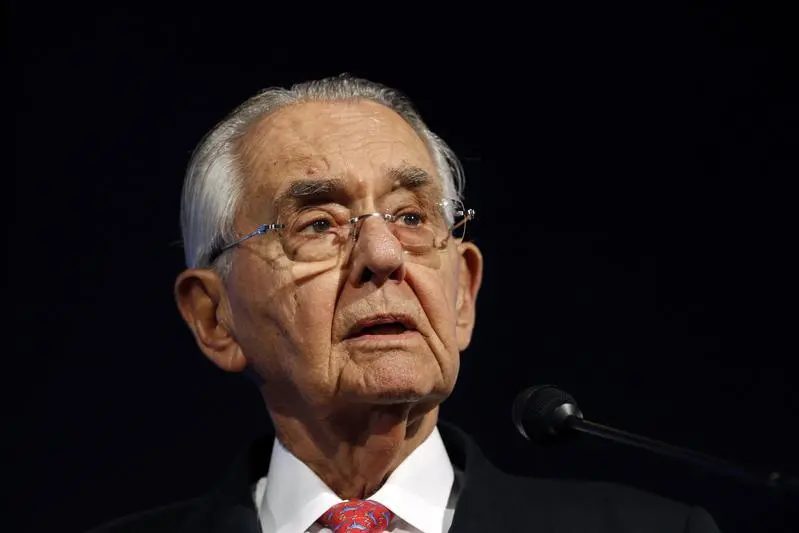PHOTO
NEW YORK, (Reuters Breakingviews) - Pete Peterson always knew the value of a dollar. The former Nixon cabinet member and Lehman chief executive revolutionized modern finance by teaming with Stephen Schwarzman to found Blackstone and foster the leveraged-buyout business. He later used his wealth to champion the cause of deficit reduction. Washington has yet to repay the obligation.
He was the son of Greek immigrants who ran a café in a small Nebraska town during the Dust Bowl years of the Great Depression. It was a formative experience for Peterson, who learned “the lesson of never, even in the bad times, spending more than you earned,” as he wrote in his 2009 biography “The Education of an American Dreamer.” He obtained an undergraduate degree in retailing from Northwestern University and an MBA from the University of Chicago, where his teachers included future Nobel Prize-winning economist Milton Friedman.
After stints in market research and advertising, Peterson went to work for movie-camera maker Bell and Howell and rose to chairman and CEO in 1963. That gave him firsthand experience with the rise of Japan's industrial competition.
Eight years later then-President Richard Nixon hired him to serve as his assistant for international economic affairs. That gave Peterson a key role to play in pushing for the 15 percent import surcharge Nixon imposed when he took the United States off the gold standard in 1971, recalls Fred Bergsten, a former administration colleague and co-founder of the Washington-based Peterson Institute for International Economics.
He then became commerce secretary but Nixon fired him after his re-election, sparing Peterson any Watergate taint. Lehman Brothers lured him to New York in 1973 as a vice chairman, then quickly made him chairman and CEO to rein in bond-trading losses.
He led a turnaround only to lose a power struggle to Lewis Glucksman in 1983. That turned out to be doubly fortuitous. First, it meant he avoided another bond-market bust that laid Lehman low a year later.
Second, it set him up for his greatest trade: teaming up with fellow Lehman alumnus Schwarzman to found Blackstone. What started as a mainly advisory shop quickly seized on the budding buyout business, a sign of the deft market sense that has built Blackstone into the world’s largest alternative investments firm, managing more than $430 billion. The company went public in 2007 in good part to enable Peterson to cash out, which he did to the tune of nearly $1.9 billion.
Peterson devoted much of his later years to the cause of fiscal probity, helping set up the Concord Coalition in 1992 with former U.S. senators Paul Tsongas, a Democrat, and Warren Rudman, a Republican. Never a supply-sider, Peterson criticized George W. Bush’s 2003 tax cuts and advocated for reforms to entitlement programs to contain the federal deficit.
Bipartisanship was already no longer in vogue, though. With Donald Trump’s tax cuts threatening to bring back trillion-dollar deficits, Washington is losing Peterson’s voice just when it may be needed most.
CONTEXT NEWS
- Peter Peterson, a former secretary of commerce in President Richard Nixon's administration and Lehman chief executive who co-founded private-equity giant Blackstone, died on March 20 at his home in New York City. He was 91.
(Editing by Rob Cox, Antony Currie and Martin Langfield)
© Reuters News 2018




















